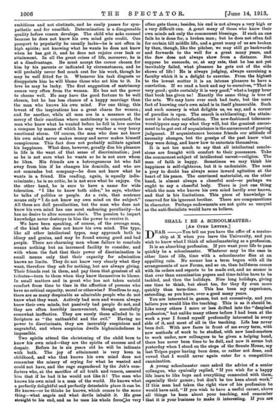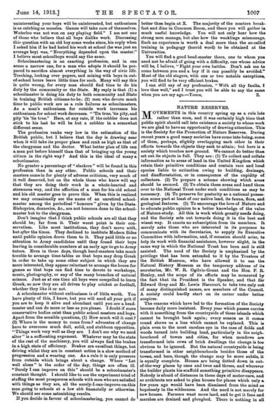D EAR —,—You tell me you have the offer of a
master- ship at X when you leave the University, and you wish to know what I think of schoolmastering as a profession.
It is an absorbing profession. If you want your life to pass quickly be a schoolmaster. Whatever may be the case in other lines of life, time with a schoolmaster flies at an appalling rate. No sooner has a term begun with all its arrangements of new Forms, and so on, than halfAterm comes with its orders and reports to be made out, and no sooner is that over than examination papers and time-tables have to be tackled, and then the holidays. Nice long holidays, giving one time to think, but short too, for they fly even more quickly than term-time. This has been my experience, extending, as you know, over a good many years.
You are interested in games, but not excessively, and you believe you would like the teaching. This is as it should be. Like many others I more or less drifted into the "despised profession," but unlike many others before I had been at the work a year I found myself profoundly interested in every side of it, and most of all in the teaching. Life has never been dull. With new faces in front of me every term, with new methods of work to be studied, with new head-masters to work under, new colleagues to be given a helping hand, there has never been time to be dull, and now it seems but yesterday when I stood on the steps of the Senate House, my last Tripos paper having been done, or rather not done, and vowed that I would never again enter for a competitive examination.
A young schoolmaster once asked the advice of a senior colleague, who cynically replied, "If you wish for a happy life learn to like boys and everything connected with them, especially their games ; but don't be too keen about work." If this man had taken the right view of his profession he would have said, "If you wish to have a useful career, above all things be keen about your teaching, and remember that it is your business to make it interesting. If you are
uninteresting your boys will be uninterested, but enthusiasm is as catching as measles. Games will take care of themselves. Waterloo was not won on any playing field." I am not one of those who believe that all boys dislike work. Discussing this question with an old boy some weeks since, his reply when I asked him if he had hated his work at school (he was just an average boy) was, "Everything depended upon the master." I believe most schoolboys would say the same.
Schoolmastering is an exacting profession, and in one sense a narrow one, for a man who adopts it should be pre- pared to sacrifice almost everything in the way of civic life. Teaching, looking over papers, and mixing with boys in out- of-school hours leave little time for such. Many will say this is quite wrong, for every man should find time to do his duty by the community or the State. My reply is that (1) a schoolmaster is doing his duty to both community and State in training British citizens-to-be; (2) men who devote much time to public work are as a rule failures as schoolmasters, As a man's enthusiasm for outside work increases his enthusiasm for school work decreases. " 'Tis true, 'tis pity, and pity 'tis 'tis true." Here, at any rate, if the cobbler does not stick to his last he will be but a cobbler in a somewhat different sense.
The profession ranks very low in the estimation of the British public, but I believe that the day is drawing near when it will take its proper place and rank as high as that of the clergyman and the doctor. What better plan of life can a man put before himself than that of bringing up the young citizen in the right way P And this is the ideal of many a schoolmaster.
No greater a percentage of " slackers " will be found in this profession than in any other. Public schools and their masters come in for plenty of adverse criticism, very much of it well deserved, but on the whole those who know will say that they are doing their work in a whole-hearted and strenuous way, and the affection of a man for his old school and his old master goes to prove this. When this is realized we may occasionally see the name of an unretired school- master among the periodical " honours " given by the State. Bishoprica, deaneries, &c., are not honours done to the school- master but to the clergyman.
Don't imagine that I think public schools are all that they should be; far from it. Their worst point is their con- servatism. Like most institutions, they don't move with, but after the times. They declined to institute Modern Sides until public opinion drove them to it. They paid little or no attention to Army candidates until they found their boys leaving in considerable numbers at an early age to go to Army tutors. Even in these days, though bead-masters take much trouble to arrange time-tables so that boys may drop Greek in order to take up some other subject in which they are more interested, they appear reluctant to arrange the hours for games so that boys can find time to devote to workshops, music, photography, or any of the many branches of natural science. Just as at one time all boys were compelled to learn Greek, so now they are all driven to play cricket or football, whether they like it or not.
A schoolmaster without enthusiasm is of little worth. You have plenty of this, I know, but you will need all your grit if you are to keep it alive and abundant until you are a head- master and can do more or leas as you please. I doubt if more conservative bodies exist than public school masters and boys. Apart from the sensible questions, (1) How much will it cost (2) Where is the money to come from ? advocates of change have to overcome much dull, solid, and stubborn opposition. " Things work very well as they are. I don't see why we need alter " is a suffocating argument. Whatever may be the state of the rest of the machinery, you will always find the brakes in a high state of efficiency. Brakes are excellent things, but driving whilst they are in constant action is a slow method of progression and a wearing one. As a rule it is only pressure from outside which brings about a change. Where "Let well alone" is the order of the day, things are often ill. "Surely I can improve on this" should be a schoolmaster's constant thought. I should like to see the experiment tried of staffing the most prosperous schools with men who are satisfied with things as they are, all the surely-I-can-improve-on-this men going to schools at a low ebb financially or otherwise. We should see some astonishing results.
If you decide in favour of schoolmastering, you cannot do better than begin at X. The majority of the masters break. fast and dine in Common Room, and there you will gather in much useful knowledge. You will not only hear how the strong men manage, but also how the weaklings mismanage. Such an experience is worth a deal more than the so-called training in pedagogy (horrid word) to be obtained at the Universities.
You will find a good head-master there, one to whom you need not be afraid of going with a difficulty, one whose advice will he, I believe, " Fight your own battles. Don't ask me to come between you and a boy if it can possibly be avoided." Most of the old stagers, with one or two notable exceptions. you will find to be very efficient brakes.
I can still say of my profession, " With all thy faults, I love thee well," and I trust you will be able to say the same
when you are my age.—Yours, Z.















































 Previous page
Previous page